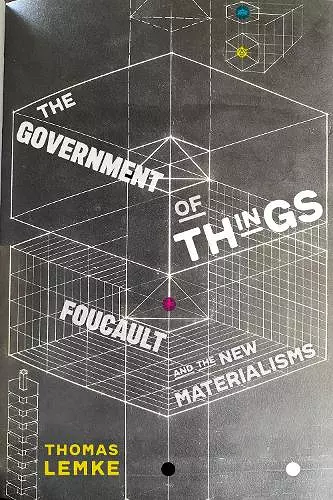The Government of Things
Foucault and the New Materialisms
Format:Paperback
Publisher:New York University Press
Published:28th Sep '21
Currently unavailable, and unfortunately no date known when it will be back
This paperback is available in another edition too:
- Hardback£74.00(9781479808816)

Examines the theoretical achievements and the political impact of the new materialisms
Materialism, a rich philosophical tradition that goes back to antiquity, is currently undergoing a renaissance. In The Government of Things, Thomas Lemke provides a comprehensive overview and critical assessment of this “new materialism”. In analyzing the work of Graham Harman, Jane Bennett, and Karen Barad, Lemke articulates what, exactly, new materialism is and how it has evolved. These insights open up new spaces for critical thought and political experimentation, overcoming the limits of anthropocentrism.
Drawing on Michel Foucault’s concept of a “government of things”, the book also goes beyond new materialist scholarship which tends to displace political questions by ethical and aesthetic concerns. It puts forward a relational and performative account of materialities that more closely attends to the interplay of epistemological, ontological, and political issues.
Lemke provides definitive and much-needed clarity about the fascinating potential—and limitations—of new materialism as a whole. The Government of Things revisits Foucault’s more-than-human understanding of government to capture a new constellation of power: “environmentality”. As the book demonstrates, contemporary modes of government seek to control the social, ecological, and technological conditions of life rather than directly targeting individuals and populations. The book offers an essential and much needed tool to critically examine this political shift.
At once an incisive critique of new materialisms and a timely extension of Michel Foucault’s analytics of government, Thomas Lemke’s The Government of Things is indispensable for anyone concerned with emerging forms of environmentality and the missing politics of the 'material turn.' By revisiting key terms in Foucault's later writings—dispositive, technology, milieu—and aligning an analytics of government with key insights from feminist and postcolonial science and technology studies, Lemke gives us powerful tools to analyze and historicize the dynamic socio-techno-ecological arrangements that differentially and unequally materialize human and nonhuman life and to imagine how they might be composed otherwise. -- Bruce Braun, co-editor of Political Matter: Technoscience, Democracy, and Public Life
The Government of Things is an invaluable exploration and appraisal of new materialist approaches, advancing the argument that, while such approaches have much to offer, they also have distinctive weaknesses in handling questions of history and politics. Thomas Lemke proposes to remedy these shortcomings by drawing from Michel Foucault’s 'tool-box,' thus situating the book's analysis at the vital intersection between science and technology studies and the study of governmental rationality. Particularly for those of us who share Lemke’s ambivalence about new materialism, this book is an essential guide to the limits of this approach—and to avenues for productively combining it with other modes of inquiry. -- Stephen J. Collier, co-author of The Government of Emergency: Vital Systems, Expertise, and the Politics of Security
In that Thomas Lemke’s book, The Government of Things: Foucault and the New Materialisms, supports my view for a materialist reading of Foucault, it constitutes a welcome addition to the literature. -- Mark Olssen * Social Forces *
The Government of Things allows for a very fruitful encounter between Foucault and new material concerns. While the ultimate trajectory of Lemke's analytic of the government of things is a bit unclear, it should not be doubted that he has produced a remarkable piece of scholarship that will continue to generate innovative readings of Foucault. -- Conor Bean * Foucault Studies *
ISBN: 9781479829934
Dimensions: unknown
Weight: 463g
312 pages